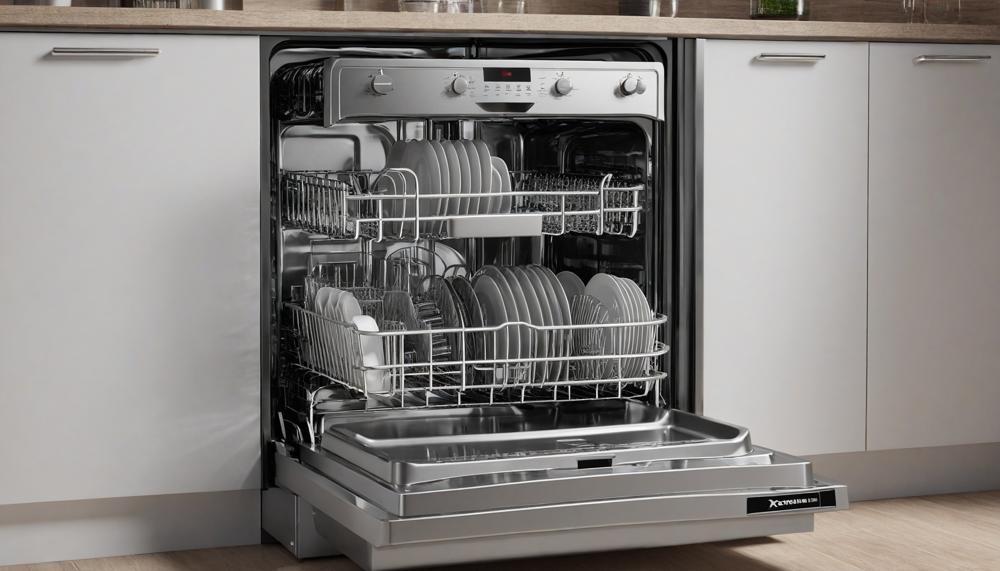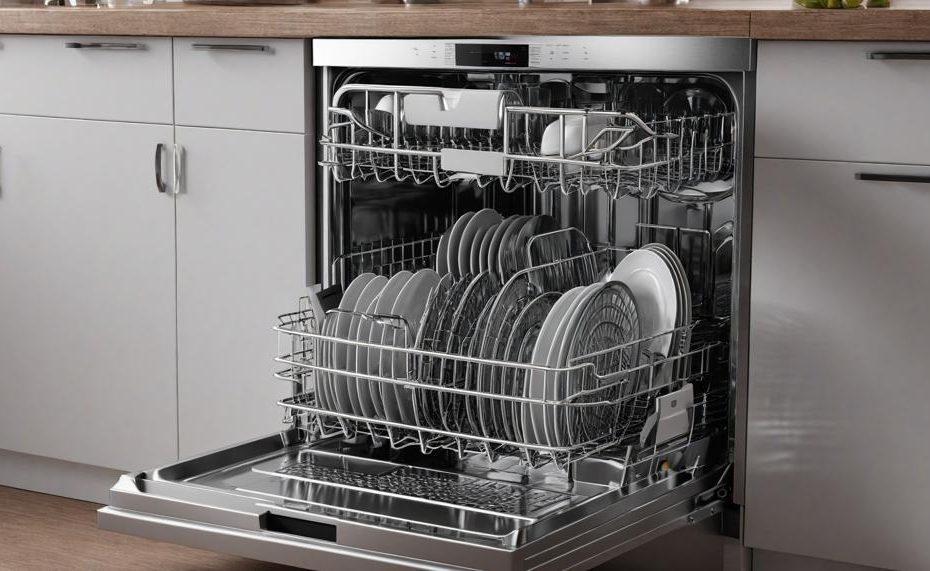You’ve decided it’s time to part ways with your old dishwasher. Whether you’re upgrading to a newer model or it’s just time to say goodbye, disposing of a dishwasher properly is essential for both the environment and your peace of mind. The process might seem straightforward, but a few important steps ensure that your old appliance is handled responsibly.
First and foremost, checking local regulations is crucial to understand the proper disposal methods in your area. Before you start, ensure the dishwasher is disconnected from both power and water sources to avoid any accidents.

Next, you’ll want to safely remove any hazardous substances, like leftover detergents, following the manufacturer’s instructions. Preparing for transportation involves emptying the dishwasher and removing any detachable parts to make handling easier. If your dishwasher is still in working condition, consider donating it to someone in need or a local charity. Not only does this help others, but it also extends the appliance’s life.
If it’s no longer functional, recycling at a designated facility is the best option to ensure the materials are reused efficiently. You can also hire a professional disposal service to handle the process if you’re not up for the task. And as a last resort, consult with local authorities before disposing of it in a landfill.
Proper disposal not only helps protect the environment but also makes efficient use of valuable resources. Ready to get started? Here are the key takeaways:
- Check Local Regulations: Understand the rules and guidelines for appliance disposal in your area.
- Disconnect Safely: Ensure the dishwasher is unplugged and disconnected from water lines.
- Remove Hazardous Substances: Clean out any remaining detergents or chemicals.
- Prepare for Transport: Empty the appliance and remove detachable parts.
- Consider Reuse or Donation: If the dishwasher still works, consider giving it away.
- Recycle: Take it to a designated recycling facility.
- Professional Services: Consider hiring a disposal service.
- Last Resort: Consult with authorities before using a landfill.
With these steps in mind, you’ll be able to dispose of your dishwasher in a way that’s both responsible and easy.
Contents
Why Should You Scrap Your Dishwasher?
Scrapping your dishwasher, rather than merely disposing of it, offers numerous advantages that benefit both the environment and your wallet. Here are the primary benefits:
Environmental Protection
Scrapping helps reduce landfill waste and lowers pollution. Dishwashers contain materials like metal, plastic, and electronic components that can be harmful to the environment if not disposed of properly. Recycling these materials prevents them from leaching into the soil and water.
Resource Recovery
Many parts of a dishwasher can be reused or recycled, reducing the need for new raw materials. Metals, such as steel and aluminum, can be melted down and repurposed, conserving natural resources.
Economic Benefits
You can make money by selling parts or scrap metal. Websites like Craigslist or local recycling centers might offer cash for certain components or the entire unit.
Supporting Charitable Causes
If your dishwasher is still functional, donating it to a charity can provide a valuable resource to those in need. Many organizations accept household appliances to help low-income families.
Creative Repurposing
Repurposing parts of your old dishwasher can lead to creative and practical uses. For instance, dishwasher racks can be used for storage solutions in garages or sheds.
How to Prepare Your Dishwasher for Scrap
When preparing your dishwasher for disposal or scrap, follow these detailed steps:
Check Local Regulations
Investigate specific guidelines in your area regarding dishwasher disposal. Municipalities often have rules about recycling appliances and hazardous waste management.
Disconnect from Power and Plumbing
Ensure safety by unplugging the dishwasher from the electrical outlet. Shut off the water supply and disconnect the water inlet and drain hoses. Use a wrench if needed, and have towels handy to catch any water spillage.
| Step | Description | Tools Required |
| Unplug | Disconnect the power cord from the outlet | None |
| Turn off water | Shut off water supply valve | None |
| Disconnect hoses | Detach water inlet and drain hoses | Wrench, towels |
Remove Hazardous Substances
Clean out any remaining detergent, rinse aid, or chemicals. Follow the manufacturer’s instructions for safe disposal of these substances. Proper handling prevents environmental harm.
Prepare for Transportation
Empty the dishwasher completely, removing all racks, trays, and detachable components. Secure loose parts with tape or place them in a box to avoid damage during transport.
Consider Reuse or Donation
If the dishwasher is still operational, consider donating it to charities or selling it. Many organizations accept working appliances for those in need.
Recycle the Dishwasher
If the appliance is non-functional, locate a recycling facility or scrap metal dealer. Many parts of a dishwasher, including metal, plastic, and electronics, can be recycled.
Hire a Professional Disposal Service
For convenience, consider hiring a professional service to handle the removal and recycling. This ensures compliance with local regulations and environmental standards.
Dispose in a Landfill (Last Resort)
If recycling options are unavailable, contact local authorities to understand the proper procedure for landfill disposal. This should be the last resort due to environmental concerns.
Proper Disposal Methods
Disposing of a dishwasher properly involves several crucial steps to ensure safety and environmental responsibility. Here’s a detailed guide to help you through the process:
| Step | Action | Details |
| 1 | Check Local Regulations | Understand local guidelines to ensure compliance. |
| 2 | Disconnect Safely | Unplug from power and disconnect water supply. |
| 3 | Remove Hazardous Substances | Dispose of detergents and chemicals properly. |
| 4 | Prepare for Transport | Empty and secure the dishwasher. |
| 5 | Consider Reuse or Donation | Donate or sell if still functional. |
| 6 | Recycling | Take to a recycling facility. |
| 7 | Hire a Professional Service | Use a disposal service for eco-friendly disposal. |
| 8 | Landfill Disposal | Only as a last resort, consult local authorities. |
Benefits of Dishwasher Recycling
Properly disposing of a dishwasher through recycling offers significant environmental advantages. Let’s delve into these benefits:
- Reduction of Landfill Waste: Recycling dishwashers helps divert waste from landfills. Since approximately 85% of dishwasher components are recyclable, recycling significantly decreases the amount of trash that would otherwise occupy landfill space.
- Conservation of Natural Resources: Recycling recovers valuable materials like metals and plastics, which can be reused in manufacturing new products. This reduces the need to extract and process raw materials, conserving natural resources and energy.
- Prevention of Hazardous Chemical Leaks: Dishwashers contain substances that can be harmful to the environment, such as refrigerants and insulation materials. Recycling ensures these chemicals are handled and disposed of properly, preventing soil and water contamination.
- Reduction of Greenhouse Gas Emissions: Manufacturing new materials requires substantial energy, often from fossil fuels. By recycling, we cut down on the energy needed for production, thus reducing greenhouse gas emissions associated with manufacturing processes.
- Economic Benefits: Recycling programs can create jobs and stimulate the economy. The process of collecting, sorting, and processing recyclable materials provides employment opportunities in local communities.
- Extended Product Life: Donating a still-functional dishwasher can extend its usable life, reducing the demand for new appliances. This also lessens the environmental impact associated with the production and disposal of new dishwashers.
Conclusion
Disposing of an old dishwasher responsibly is more than just a task—it’s a contribution to environmental sustainability and resource efficiency. By following a few key steps, you can ensure that your old appliance is disposed of properly, benefiting both you and the planet.
First, always check local regulations to understand the specific disposal methods available in your area. Disconnect the dishwasher safely from power and water sources to avoid any accidents. Clean out any leftover detergents or hazardous substances as per the manufacturer’s guidelines. For easier handling and transport, empty the dishwasher and remove any detachable parts.
If your dishwasher is still operational, consider donating it to a local charity or someone in need. This not only extends the appliance’s life but also helps others. For non-functional units, recycling at a designated facility ensures that valuable materials like metals and plastics are reused, reducing the need for new raw materials. Professional disposal services are also a convenient option if you prefer not to handle the process yourself. As a last resort, consult with local authorities before considering landfill disposal.
Scrapping your dishwasher, rather than simply disposing of it, has numerous benefits. It protects the environment by reducing landfill waste and pollution, and it allows for the recovery of valuable resources. Financially, you can earn money by selling parts or scrap metal. Donating a functional dishwasher supports charitable causes, and repurposing parts can lead to creative new uses.
By scrapping and disposing of your dishwasher properly, you are taking a significant step towards environmental responsibility and resource conservation.





